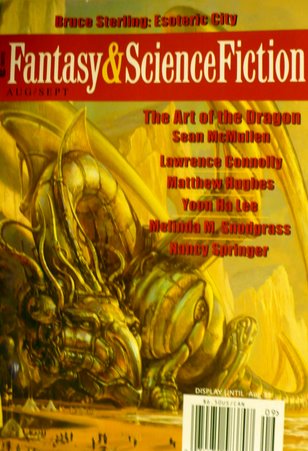
Review issues of the July-August Fantasy & Science Fiction have gone out to bloggers; I’ve just gotten my comps. My thanks to editor Gordon Van Gelder for all his support and enthusiasm for Georges-Olivier Châteaureynaud’s story, “Icarus Saved from the Skies.†He’s opened a thread for comments on the issue here. The latest from him:
Now’s a good time to let your readers know the issue is out—copies should be on the newsstands, while subscribers who sign up for a year of F&SF will still start off with this issue. (If you’re going to encourage people to subscribe, tell them to put a message in their order that you sent them. I’ll give a cookie of some sort to anyone who persuades ten people to subscribe.)
Bloggers are already chiming in! Caren “spitkitten†Gussoff singles out in her review “a translation of a short piece… whose ending has all the punch of a tickle but bowls over in its restraint,†while Aaron M. Wilson at The Soulless Machine Review devotes a post discussing the inevitable Marvel mutant associations the story takes on in an American context, calling it “a train wreck of emotions that sends the winged-narrator over the side of a cliff. Don’t miss it.†Many thanks for the kind words!
The shift in cultural context brings with it an interesting, almost temporal shift in terms of dating subject matter. The notion of the person with powers who just wants to be normal is probably, because of comics, way more played out here than in France, but being normal doesn’t quite carry the same weight in a less markedly conformist society, where the choice is less either/or, the dichotomy between normal and not less damningly clear-cut. The normal lives Americans yearn for often involve some idealized happiness, itemized down to the last possession by our pursuit thereof—Superman’s corn-fed family fantasies, for instance. Many Châteaureynaud protagonists tend to want to be normal in a more retiring, passive, even self-effacing way; love and happiness don’t have to enter into it. His heroes and narrators are usually marginal, outcast dreamers and luckless, well-meaning Everymen.
For me, the story skewers both the longing to be normal and the drive not to be, the wish to lead one’s own life, and the wish to live through others. It’s a savage parable of couplehood’s codependencies, like one of those Cheever stories where at the end the husband comes crawling back to his wife, or vice versa, though you know whatever issues triggered the episode haven’t been addressed, merely momentarily elided: tearful promises, apologies. It speaks to how we’d rather murder our lovers than be let down by them and perhaps we do, metaphorically, all the time, when we let love die. Its ending limns the kind of emotional exhaustion that brings people too used to each other back together. There’s no shortage of defeatism in the sense of mutual surrender. Here are two people who deserve each other. It has all the Hitchcockian darkness of Grace Kelly standing behind the wheelchair-bound Jimmy Stewart and pushing… for marriage.
What has always sold the story for me is its final line, cruel in its irony in a way I consider traditionally French, like piercing court wit. The modern, more Chekhovian literary short story has largely abandoned the twist ending as gimmicky, but few twist endings truly trap character in befitting ironies of fate. Perhaps the most famous example, still widely taught, is Maupassant’s “The Necklace,†an early masterpiece of the short story in which a bourgeois wife’s years of hard labor, ostensibly curing her of youthful superficiality, prove to have been in pointless payment for a lost necklace of paste. What, then, has she learned? What are we to, as readers?
This twist, in French, is termed the chute, which literally means “fall†(as in the title of the Camus novel). The chute, as Jacqueline Peytavi would have it, turns an anecdote into an event. “Unpredictable, surprising, pertinent, and consistent,†it releases pent-up “narrative tension.†It’s a testament to the author’s ingenuity, and the many levels “Icarus†works on that the chute in this story should result from a very literal fall.
Also wanted to say: as a writer, I’m well aware of the delicate and artful line a translator must walk to perserve faithfully an author’s meaning, tone, voice, and resonance–part writer themselves, part puzzle solver.
You did a really lovely job with this piece.